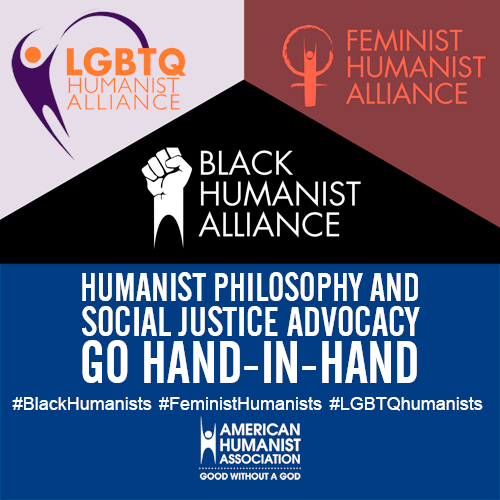
If you, like me, are tired of that obnoxious slogan “I’m not a feminist, I’m a humanist”, there’s good news: now you don’t have to choose!
To strengthen the humanist presence in social justice movements, today the American Humanist Association launched the Black Humanist Alliance, an adjunct organization that will promote racial justice and solidarity between the Black and humanist communities. In conjunction with the launch, the American Humanist Association is also relaunching its women’s rights adjunct, the Feminist Humanist Alliance, and its LGBTQ adjunct, the LGBTQ Humanist Alliance.
Since this is a drum I’ve often banged, I want to praise the AHA for doing this. The atheist movement in America has too often resembled a country club for straight white men. We’re represented all out of proportion to our numbers in broader society, while other kinds of people are underrepresented. Whatever the reasons for that, it’s a recipe for irrelevance and dwindling numbers as the country becomes more diverse, if we’re complacent and don’t do anything to change it. (I also approve of the hiring of my Patheos colleague Sincere Kirabo as the AHA’s social justice coordinator.)
But more important than that, humanism is supposed to be a philosophy that appeals to and benefits all human beings. If that turns out not to be true in practice – if there are broad groups of people who are consistently underrepresented or excluded – then it’s worth inquiring into why that is, and letting those people tell us about what matters to them and what we can do to promote their interests. That critical self-examination may be difficult; it may unearth uncomfortable truths that we’d prefer not to face. But if there’s any group of people in the world who don’t flinch from turning a skeptical eye on themselves, who’ll welcome the truth whatever it is, it ought to be secular humanists.
None of these groups are brand-new or revolutionary ideas. As the Feminist Humanist Alliance’s website says, they’ve existed in one form or another as far back as 1977. The LGBTQ Humanist Alliance is also a preexisting group that’s being relaunched. The Black Humanist Alliance is new, although organizations that support black freethinkers aren’t. And women and minorities were already making inroads into the secular community and will likely continue to do so whether existing groups reach out to them or not; but welcoming them in is the right thing to do, and it will only speed that progress.
Nevertheless, and to no one’s surprise I’m sure, the AHA’s announcement on Twitter and Facebook provoked an epic wave of screeching and sulking from no-account trolls. Most of the complaints are just sheer, ugly prejudice and hatred – the kind of regressive attitudes that we don’t want or need in humanism. If the AHA and other secular groups embracing social justice chases them off, so much the better. It’s a sad commentary on our movement that there were so many racists, sexists or other kinds of bigots already inside the gates, but it’s never too late to start sweeping them out. (If nothing else, the outbursts of anger over the announcement of these groups shows why they’re needed.)
The one criticism that’s worth responding to is the claim that humanism is by definition a philosophy that embraces everyone, and to have separate interest groups within it would be “divisive” – some people used the term “segregating”. Why can’t we all be humanists together, these people suggest, and not try to parcel ourselves out into smaller groups?
The purpose of humanism is to make human lives better. That’s what it means: that human well-being is the ultimate standard of value and that people should be treated accordingly. Having one undifferentiated humanism would be fine if all people suffered from exactly the same problems and injustices. But that’s obviously not the case.
Anyone who pays attention knows that different groups of people face different cruelties and oppressions: black people face violent and arbitrary law enforcement, women face misogynist harassment and cruel laws that constrict their choice of what to do with their own bodies, the LGBT community faces continuing discrimination in spite of securing marriage equality, and so on. These are all human-rights issues that humanists should care about. Having special-purpose caucuses is a way to ensure each of these causes gets due attention and none are neglected.
Of course, if being a humanist means caring equally about all issues at all times, then the people who complain about these adjunct groups should already have been participating in Black Lives Matter protests, pro-choice marches, Equal Pay Day letter-writing campaigns, and so on. Needless to say, I doubt that’s the case. What they’re really mad about, I suspect, is that the formation of these groups takes away their ability to ignore these causes. It’s not an unsegregated humanism they want, but a limited humanism, one that confines itself to the narrow set of issues within their comfort zone and never makes them question their own implicit prejudices.
The complainers won’t get what they want, and we should be glad for that. A more diverse humanism is a stronger humanism. Bringing all these vital and urgent causes under our umbrella widens our reach and gives us moral clarity and relevance. That’s a lesson the entire secular community has resisted and needs to learn.